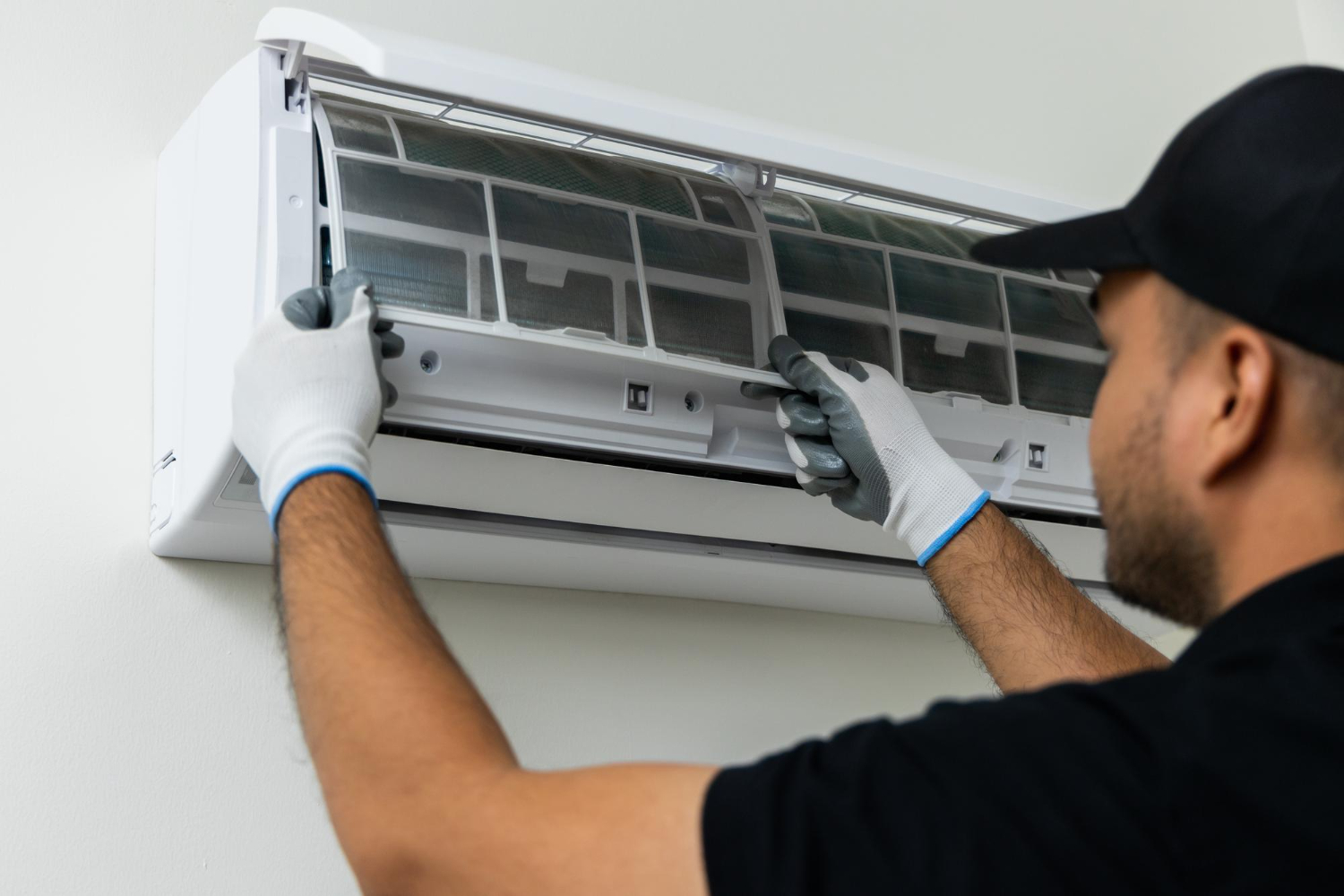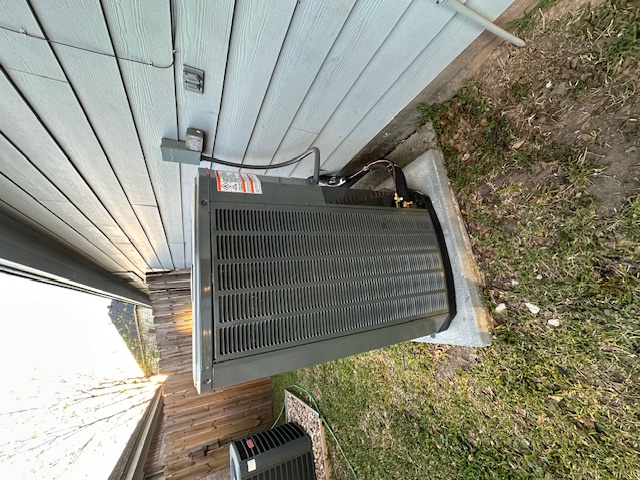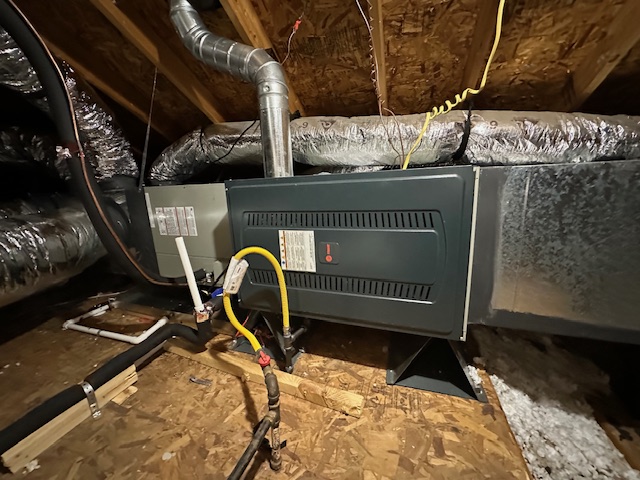Professional home AC installation ensures proper sizing, safe electrical connections, and optimal performance that can extend your system's lifespan and maximize energy efficiency.
Installing a new air conditioning system represents one of the most significant home comfort investments homeowners will make. While some consider tackling the project themselves to save money, the complexity of modern HVAC systems requires specialized knowledge and equipment that extends far beyond basic handyman skills.
The difference between a professionally installed system and a DIY attempt often becomes apparent in utility bills, repair frequency, and overall comfort levels throughout the home.
The decision between professional installation and DIY approaches involves weighing upfront costs against long-term performance, safety considerations, and warranty protection. In this article, you’ll learn how to evaluate professional home ac installation versus DIY, covering costs, safety, warranties, and long-term performance.
Here’s what you need to know:
- The risks and rewards of DIY AC installation
- Why professional home AC installation makes a difference
- Comparing real costs: DIY vs. professional install
- What to expect from reputable ac installation companies
- Horizon Air Solutions: Houston's choice for professional AC installation
Keep reading! Understanding what reputable installation companies provide helps homeowners make informed choices about protecting their investment and ensuring air conditioning units last their expected lifespan.
The risks and rewards of DIY AC installation
DIY AC installation presents significant safety hazards, hidden costs, and warranty complications that often outweigh the initial savings. Most homeowners underestimate the technical expertise required and face expensive mistakes that professional installation would prevent.
What DIY AC install kits don't tell you
DIY AC kits rarely include essential components needed for proper installation. Most kits lack adequate refrigerant line sets, electrical connections rated for the specific unit, and proper insulation materials.
The instruction manuals provided with these kits assume basic HVAC knowledge that most homeowners don't possess. Complex electrical wiring requirements, proper refrigerant handling procedures, and load calculations are often oversimplified or omitted entirely.
Missing components typically include:
- Professional-grade refrigerant gauges
- Vacuum pumps for proper system evacuation
- Leak detection equipment
- Code-compliant electrical disconnects
Refrigerant handling requires EPA certification, which DIY kits don't mention. Adding or removing refrigerant without proper certification violates federal law and can result in substantial fines.
When a DIY project can cost more than it saves
Installation errors frequently damage expensive components that warranty won't cover. Improper electrical connections can damage the compressor, while incorrect refrigerant levels reduce efficiency and shorten system lifespan.
Rework costs often exceed professional installation fees. Hiring contractors to fix DIY mistakes typically costs 30-50% more than initial professional installation since technicians must troubleshoot existing work.
Common costly mistakes include:
- Undersized or oversized units reducing efficiency
- Improper ductwork causing air leaks
- Electrical errors damaging control boards
- Refrigerant leaks requiring system replacement
Many professional vs DIY installation scenarios reveal hidden expenses. Emergency repairs during peak seasons can cost double normal rates when DIY installations fail.
Energy bills increase substantially with improper installation. Poor ductwork sealing, incorrect refrigerant levels, and inadequate electrical connections can increase operating costs by 20-40% annually.
Safety, permits, and warranty issues to consider
According to the U.S. EPA, under Section 608 rules, only certified technicians may service AC equipment using non-exempt refrigerants, improper charging or handling is illegal and can trigger.
Electrical work poses serious safety risks without proper training. AC units require dedicated circuits, proper grounding, and code-compliant disconnects that incorrect installation can cause fires or electrocution.
Most municipalities require permits for AC installation that DIY installers often ignore. Failed inspections can delay occupancy permits and create liability issues for insurance claims.
Permit requirements typically include:
- Electrical work inspection
- Refrigerant line inspection
- Final system operation test
- Building code compliance verification
Manufacturer warranties become void with improper installation. Most AC warranties require professional installation by licensed technicians and proper system commissioning documentation.
Insurance claims may be denied for damages caused by unpermitted work. Homeowner policies often exclude coverage for DIY electrical or HVAC installations that don't meet local codes.
Refrigerant leaks create environmental hazards and legal liability. Improper handling can release harmful chemicals and result in EPA fines ranging from $10,000 to $25,000 per violation.
Why professional home AC installation makes a difference
Licensed professionals bring specialized expertise and proper tools to ensure optimal system performance, while their knowledge of sizing calculations and code requirements protects homeowners from costly mistakes and safety hazards.
What licensed HVAC contractors bring to the table
Licensed HVAC contractors possess specialized training that covers refrigerant handling, electrical connections, and safety protocols. They understand the complexities of modern air conditioning systems and can navigate potential installation challenges.
Professional technicians carry commercial-grade tools and equipment that most homeowners lack. These tools ensure precise measurements, proper connections, and safe handling of refrigerant lines.
Licensing requirements mandate continuing education, keeping contractors current with industry standards and new technologies. This knowledge translates directly into better installation practices and system performance.
Experienced contractors can identify potential issues before they become problems. They spot structural limitations, electrical capacity concerns, and ventilation challenges that untrained installers might miss.
Professional installation teams work efficiently, completing most residential installations in a single day. Their systematic approach minimizes disruption to household routines while ensuring thorough work.
How pros optimize sizing, airflow, and energy use
Proper sizing calculations require detailed load assessments that consider square footage, insulation levels, window placement, and local climate factors. Professional AC install teams perform these calculations to prevent oversized or undersized systems.
Oversized units cycle on and off frequently, wasting energy and failing to remove humidity effectively. Undersized systems run constantly without achieving desired temperatures, leading to premature equipment failure.
According to the U.S. Department of Energy, oversized air conditioners cool quickly but cycle off before properly dehumidifying, leading to clammy comfort and wasted energy—precise sizing prevents.
Ductwork design and installation significantly impacts system efficiency and comfort. Professionals calculate proper duct sizing, minimize turns and bends, and seal all connections to prevent air leakage.
Airflow optimization involves strategic placement of supply and return vents. Contractors evaluate room layouts and furniture placement to ensure even temperature distribution throughout the home.
Refrigerant line installation requires precise measurements and proper insulation. Professional technicians test for leaks and charge systems to manufacturer specifications for optimal performance.
The role of inspections, guarantees, and code compliance
Building codes specify electrical requirements, clearance distances, and safety standards for air conditioning installations. Licensed contractors understand local codes and obtain necessary permits before beginning work.
Professional installations include comprehensive inspections of electrical connections, refrigerant levels, and system operation. These inspections identify potential issues before homeowners experience problems.
Most professional installations come with labor warranties ranging from one to five years. Equipment warranties often require professional installation to remain valid, protecting the homeowner's investment.
Code compliance inspections by local authorities verify that installations meet safety standards. Professional contractors coordinate these inspections and address any required corrections promptly.
Documentation provided by professional installers includes system specifications, warranty information, and maintenance recommendations for optimal performance. This paperwork proves valuable for future service calls and warranty claims.
Comparing real costs: DIY vs. professional install
Professional installation typically costs 2-3 times more upfront than DIY attempts, but hidden expenses and potential system failures can make DIY projects significantly more expensive over time. Houston homeowners face specific climate demands and local permit requirements that impact total project costs.
Average AC installation costs for Houston homes
Professional central air installation in Houston ranges from $4,500 to $8,500 for most residential properties. This price includes equipment, labor, permits, and basic warranty coverage.
DIY installations appear cheaper initially, with equipment costs between $2,800 and $5,200. However, homeowners must purchase specialized tools, obtain permits separately, and handle refrigerant certification requirements.
Houston-specific cost factors include:
- High humidity demands for proper sizing calculations
- Local permit fees ranging from $150-$400
- SEER rating requirements for energy rebates
- Hurricane-resistant installation standards
Many DIY attempts require professional correction, adding $1,200-$2,500 to the original budget. Refrigerant handling mistakes can result in EPA fines up to $37,500 per violation.
Professional installers provide equipment warranties, labor guarantees, and proper permit handling. They also ensure compliance with Houston's building codes and HOA requirements.
How much it costs to install ac in a 2000 sq ft house
A 2000 square foot home typically requires a 3.5 to 4-ton AC unit. Professional installation costs range from $5,800 to $9,200 depending on system efficiency and complexity.
AC installation cost varies significantly based on ductwork requirements and electrical upgrades. Homes needing new ductwork add $3,000-$5,000 to the total project cost.
Cost breakdown for professional installation:
- Equipment: $3,200-$5,500
- Labor: $1,800-$2,800
- Permits and inspections: $200-$500
- Ductwork modifications: $800-$1,500
DIY equipment costs for the same project range from $3,200-$5,500. Tool rental and purchase adds another $400-$800 to DIY budgets.
Most 2000 square foot installations require electrical panel upgrades costing $800-$1,500. Professional electricians ensure proper amperage and safety compliance.
When it pays to invest in a qualified AC installer
Complex installations involving multi-zone systems, smart thermostats, or existing ductwork modifications require professional expertise. These projects carry higher risks of costly mistakes when attempted without proper training.
Professional installation becomes essential for:
- Refrigerant line installation and charging
- Electrical connections exceeding 240 volts
- Structural modifications for equipment placement
- Warranty protection on expensive equipment
System efficiency depends heavily on proper installation techniques. Incorrectly installed units consume 15-30% more energy and experience frequent breakdowns.
Insurance claims related to DIY electrical work often face denial or reduced coverage. Professional installations include liability protection and code compliance guarantees.
Time investment for DIY projects typically exceeds 20-40 hours spread across multiple weekends. Professional teams complete most installations within 6-8 hours on a single day.
Emergency repair costs for failed DIY installations average $800-$2,200 during peak summer months. Professional installations include service call coverage and priority scheduling for warranty issues.
What to expect from reputable ac installation companies
Reliable AC installation companies provide transparent service agreements, demonstrate professional credentials, and deliver comprehensive installation packages. Homeowners should know what separates trustworthy contractors from less reliable options before making this important investment.
Signs of a professional HVAC team you can trust
Licensed and certified technicians carry proper credentials from industry organizations like NATE or EPA certifications. They arrive in marked company vehicles with uniforms and identification badges. Professional teams provide detailed written estimates rather than verbal quotes.
Reputable companies maintain active insurance coverage and bonding. They offer references from recent customers and have established business addresses. Their technicians use calibrated tools and follow manufacturer specifications during installations.
Quality contractors explain the installation process clearly and answer questions thoroughly. They respect the homeowner's property by using drop cloths and cleaning up after work. Professional HVAC teams also provide realistic timelines for project completion.
What's included in a full-service ac installation
Complete home ac install services include equipment removal, disposal of old units, and proper installation of new systems. Professional teams handle electrical connections, refrigerant lines, and ductwork modifications. They test all components before leaving the job site.
Full-service installations cover permits and inspections required by local codes. Contractors typically provide manufacturer warranties lasting 5-10 years on equipment plus 1-2 years of labor coverage. They program thermostats and demonstrate system operation to homeowners.
Quality ac installation companies include load calculations to ensure proper system sizing. They inspect existing ductwork and recommend necessary repairs or modifications. Post-installation services often include initial maintenance visits and system performance checks.
Questions to ask before signing a service agreement
Homeowners should confirm licensing numbers and verify insurance coverage before hiring contractors. Important questions include total project costs, timeline expectations, and what happens if complications arise. Customers need clarity on warranty terms and what voids coverage.
Ask about equipment options and efficiency ratings to make informed decisions. Contractors should explain financing options and payment schedules clearly. Homeowners benefit from understanding maintenance requirements that keep warranties valid.
Request details about cleanup procedures and who handles permit applications. Clarify whether the estimate includes all necessary components like electrical upgrades or ductwork modifications. Professional companies provide written answers to these questions before work begins.
Horizon Air Solutions: Houston's choice for professional AC installation
Horizon Air Solutions has established itself as Houston's leading choice for professional air conditioning installation through certified technicians, transparent pricing, and proven installation expertise that consistently delivers superior results compared to DIY approaches.
Why thousands of homeowners trust Horizon over DIY options
Professional installation eliminates the costly mistakes and safety hazards that plague DIY air conditioning projects. Thousands of homeowners trust Horizon over DIY options because of their expertise in proper sizing, electrical connections, and refrigerant handling.
DIY installations often result in improper refrigerant levels, incorrect electrical wiring, and inadequate ductwork connections. These issues lead to reduced efficiency, higher energy bills, and premature system failure.
Horizon's certified technicians possess the specialized tools and training required for safe installation. They handle refrigerant according to EPA regulations and ensure all electrical connections meet local building codes.
The company's installation process includes proper system sizing calculations based on home square footage, insulation levels, and local climate conditions. This precision ensures optimal performance and energy efficiency from day one.
Transparent pricing, certified techs, and fast installs
Horizon Air Solutions provides upfront pricing without hidden fees or surprise charges. Their quotes include all labor, materials, and permits required for complete installation.
The company employs NATE-certified technicians who undergo continuous training on the latest HVAC technologies. These professionals complete installations efficiently while maintaining strict quality standards.
Installation timeframes typically range from 4-8 hours for standard residential systems. Horizon schedules installations at convenient times and provides accurate arrival windows to minimize disruption to daily routines.
Their service area covers the Greater Houston metropolitan area from their location at 13100 Wortham Center Dr. The company maintains proper licensing and insurance coverage for all installation work.
Quality assurance includes post-installation testing of all system components, refrigerant levels, and airflow measurements to verify proper operation.
Book your professional AC install with Horizon today
Scheduling professional installation with Horizon Air Solutions begins with a free in-home consultation and system assessment. Their technicians evaluate existing ductwork, electrical capacity, and cooling requirements to recommend appropriate equipment.
The company offers financing options to make professional installation accessible for various budgets. Booking your professional AC install with Horizon ensures warranty protection and ongoing service support.
Horizon stocks high-performance HVAC equipment from leading manufacturers, providing options that balance performance, comfort, and value. Their inventory includes energy-efficient models that qualify for utility rebates.
Installation scheduling accommodates busy homeowner schedules with flexible appointment times. The company provides 24-hour emergency service for urgent cooling needs during Houston's demanding summer months.
Post-installation support includes maintenance services, warranty coverage, and repair assistance to protect the investment in professional installation.
Conclusion
Professional AC installation delivers measurable benefits that extend far beyond initial setup. Proper installation ensures optimal system performance, energy efficiency, and long-term reliability.
The expertise of trained technicians prevents costly mistakes that plague DIY installations. They perform precise load calculations, evaluate existing ductwork, and ensure proper electrical connections.
Professional installation protects homeowners' investments through proper sizing and fitting. This attention to detail prevents frequent breakdowns and reduces ongoing repair costs.
The process involves comprehensive assessment of home layout and insulation requirements. Technicians determine ideal placement locations to maximize cooling distribution throughout living spaces.
Safety considerations make professional installation essential. Improper electrical work or refrigerant handling creates serious hazards that trained professionals easily avoid.
Energy efficiency improvements result from correct installation practices. Properly installed systems consume less electricity while maintaining consistent indoor temperatures and air quality.
Post-installation support from professionals maximizes system lifespan. Regular maintenance programs help identify potential issues before they become expensive problems.
The initial investment in professional installation generates long-term savings through reduced energy bills and fewer repair needs. Homeowners gain peace of mind knowing their cooling system operates safely and efficiently for years to come.











